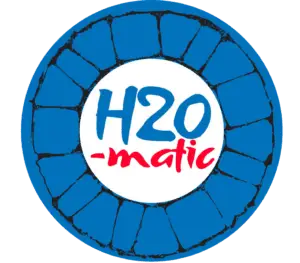Your Questions Answered
Comprehensive Resources
Frequently Asked Questions
At this time we only install custom concrete pools and do not offer fiberglass or vinyl.
A custom concrete pool typically takes between 3 – 4 months, with 3 months being the average. In addition to total project size, weather plays a key role in how long it can take as rain can delay phases of the project. We have seen some pools completed in as little as 10 weeks.
There unfortunately isn’t a straight forward answer to this. Similar to asking how much a car costs, your total pool build can vary greatly depending on a number of factors. Final material selection, size of the pool, added equipment and features, and project layout ultimately determines the cost of your project. With us being a turnkey company, we can help drive the project cost to meet your budget. With standalone pool builders, the cost of the pool is the cost of the pool. We can work with you to design the layout and pool so that it fits your budget.
YES. Over the last couple decades, we organically have grown into a company that has handled all aspects of a pool build, ultimately becoming the pool builder as well. With other pool builders, you as the homeowner become the defacto project manager, orchestrating and handling all of the various elements of the project and coordination of the different companies. With H2O-Matic, we are there the moment the first spec of dirt is moved until the last blade of grass is installed.
Your family and guests’ safety is our number one priority. At this time we do not offer pools that are dive-able. The cost of a dive-able pool is exponentially greater than a standard pool that is about 6’ in depth, and in our opinion, the risk to your safety is not worth the reward of diving into a pool.
Every project we install is based on the standard specifications outlined by the Concrete Masonry and Hardscapes Association for patios and retaining walls. As a company that has been certified with CMHA, we strictly follow their specifications to ensure that your project is built to last.
General overview of the project scope:
Planning and Design: First, decide on the size, shape, and pattern of your patio. Mark the area where the patio will be installed.
Excavation: Dig out the area to a depth of about 7-9 inches, depending on your soil and climate. This makes room for the base material.
Base Preparation: Lay down a geotextile fabric to prevent weed growth. Then, add a 4-6 inch layer of crushed stone or gravel. Compact this layer with a plate compactor to create a stable foundation.
Edge Restraints: Install edge restraints around the perimeter of the excavated area to keep the pavers in place.
Sand Bedding: Spread a 1-inch layer of coarse sand over the compacted base. Use a screed board to level the sand.
Laying Pavers: Start placing the pavers on the sand bed according to your desired pattern. Make sure they fit snugly together.
Cutting Pavers: Cut the pavers as needed to fit the edges using a masonry saw or paver cutter.
Compaction: Once all the pavers are laid, use the plate compactor to settle them into the sand bed. This will also push sand up into the joints between the pavers.
Joint Sand: Sweep sand over the entire patio to fill the joints between the pavers. Use the compactor again to ensure the sand settles into the joints. Repeat this process until the joints are completely filled.
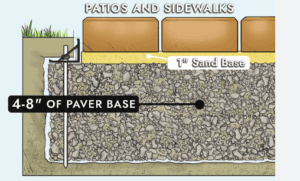
The cost of installing a paver patio varies widely because every project is unique. Factors such as material costs, the grade of the yard, and specific project requirements can significantly impact the total price. Generally, larger projects tend to have a lower price per square foot due to economies of scale, while smaller projects may have a higher price per square foot. Typically, you can expect the cost to range from as low as $20 per square foot to as high as $36 per square foot. Due to the cost of deploying our crews and bulk material purchasing minimums, we have a minimum project cost of $8,000.
Patio size will be determined based on your needs as a customer, what you inted to use the space for, and layout of your yard. Patios with multiple features such as dining space, outdoor kitchens, or fireplaces would require a larger area whereas patios that just want some buffer space from your landscape to your house can be smaller. Smaller patios range from 100-400 sqft whereas medium are about 400-800 and anything above 800 sqft is consider a large space.
As far as installation costs and concrete costs go, poured concrete is technically the most affordable per square foot. However, even though the upfront cost of pavers is higher, concrete pavers offer greater value and durability than poured concrete and stamped concrete.
While the initial cost of pavers can be higher than concrete, they offer greater long-term value by enhancing property appeal and requiring less maintenance.
For pool decking, we recommend pavers or travertine over concrete. Concrete, though cheaper, can crack and requires demolition for plumbing repairs. Pavers and travertine offer elegance, durability, and easier access for repairs, making them ideal choices for pool decks.
There are 3 main options for a pool deck:
Concrete
Pavers
Travertine or Marble
Each have their own pros and cons. As a company we do not recommend concrete, especially around pools. The cost of concrete could be attractive but if you have any issues with your pool plumbing, the concrete would need to be completely demolished to access the pipes and then re-installed whereas travertine and pavers can be pulled up in the location that needs repair work done. Additionally, concrete will crack, it is envitable and it is only a matter of time.
Travertine and pavers give a more elegant look to your pool that just cost you a lot of money to put in. Our opinion is that if your budge is tight, stay with pavers or travertine but maybe reduce the size of your pool deck to dial in costs.
Both are great options for pool decks. Travertine really only has one style, its typically a French pattern and all of the travertine looks about the same just in a different color. With travertine you really only have Ivory, Silver, or Noce. Pavers you have a much wider range of style, variety and size. You have much more options in terms of how you want your deck to look. Travertine runs about 10 degrees cooler than pavers but in the mid-day sun in the south, everything will be hot, even travertine. Travertine has pitting which are natural imperfections of the surface, depending on the grade of travertine, some will have more pitting than others. On our installs we do our best to discard any heavily pitted pieces however we cant discard all of them. Pool coping is typically installed with travertine or marble so using a paver pool deck you will likely not have an identical match but the coping would be more of an accent feature. If you wanted your pool coping to be concrete paver products, your selection is a little more limited and paver coping is typically more expensive than travertine coping.
Travertine is natural stone and is porous meaning the water doesn’t sit on top to create a hydroplane effect. It is a little bit more “slick” than concrete pavers but it is not like bathroom tile that is very slippery when wet. It is the number one choice for pool decks if that tells you anything. However, like all pool decks, concrete or travertine, it is not recommended to run around a pool.
The height of your retaining wall will depend on your yard and what the application is. Most yards that we see in the charlotte area will be easily leveled with a 4’ tall wall or less. One thing to keep in mind is that state law requires retaining walls above 4’ to be engineered and permitted which increases the cost of your wall exponentially. Our recommendation for walls that need to be above 4’ is to do a tiered approaching such as a yard that needs an 8’ tall wall would have a 4’ wall and then another wall set back about 6’ that is 4’ tall.
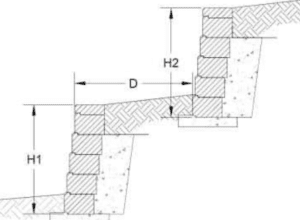
Retaining walls prices depend on size, length, materials selected, and gradation of your yard. Typically a 75’ long retaining wall is needed for most backyards that have slopes in our area. Your average 75’ long and 4’ tall wall would be between $15,000 and $20,000.
Outdoor kitchens come in all shapes and sizes. They also have a large number of different appliances that can be installed in them. Depending on how many appliances you want and what type of appliance will greatly change the price of your outdoor kitchen. Basic outdoor kitchens can start at around $15,000 whereas large outdoor kitchens with outdoor sinks, premium appliances and a large footprint, can easily approach the $40,000 mark.
All of our outdoor kitchens are 3’ tall and 3’ wide. This is the standard countertop height and gives us enough space for appliances as well as any utilities that need to be ran on the inside. The length of your kitchen will greatly depend on how many appliances you want and the general layout.
Granite. Granite by far is the superior countertop material for outdoor kitchens. It withstands weathering very well and does not stain (wine, fallen leaves from near by trees). We regularly swap out natural stone countertops for granite for customers that do not go with granite the first time around. More specifically leathered granite is the best option, it provides a textured surface that also does not absorb heat like a polished granite countertop would.
Yes, we guide you through the material selections process and handle the rest. We are a turnkey company that would coordinate and install your entire project. From permitting and inspections with the county, to order appliances and installing them, installation of your granite countertop, to running utilities such as gas and electrical. Once you select your materials we do the rest!
Yes, all of our consultations are free. It can take anywhere from 15 minutes to over an hour depending on the complexity of your project. If a design is needed it is free but depending on the complexity of your project, if we are not selected as your installer we reserve the right to bill for the cost of the design.
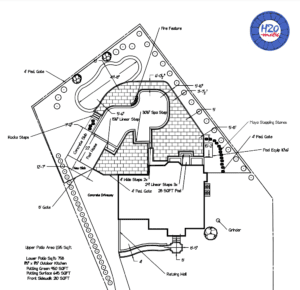
Maybe, for a standard patio with a very simple layout we typically would not do a design. For more complex projects with multiple features such as retaining walls, patios, outdoor kitchens in the project, we would want to do a design. Designs can be basic 2D bird’s eye view of the project area or 3D renderings that help you visualize the space.
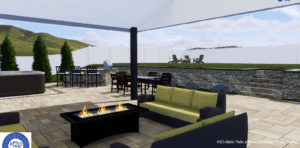

Financing Your Project
About Lyon Financial
Lyon Financial is dedicated to helping you achieve your backyard dreams with tailored financing options. Unlike traditional banks and credit unions, Lyon Financial’s expertise is uniquely focused on swimming pool loans, ensuring you receive knowledgeable and personalized service.Key Benefits of Financing With Lyon Financial
- Low, Fixed Rates: Enjoy competitive interest rates that remain consistent over the life of your loan.
- Loans Up to $200,000: Access substantial funding to cover extensive outdoor projects.
- Terms Up to 30 Years: Flexible repayment terms that fit your financial situation.
- Special Military Programs: Exclusive benefits for veterans and active military personnel.
- No Prepayment Penalties: Pay off your loan early without incurring additional fees.
- No Equity or Appraisals Required: Simplified application process without the need for home equity or appraisals.

